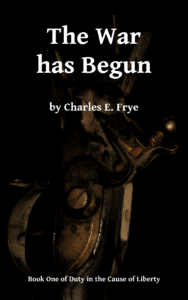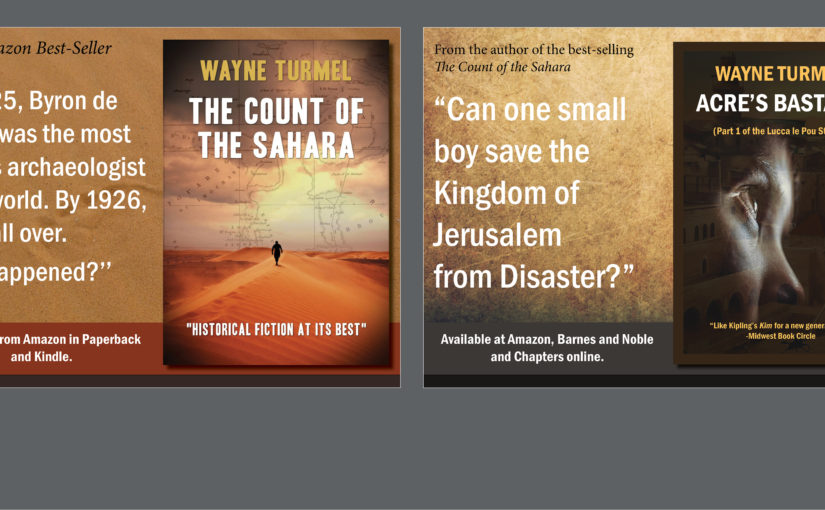The American Revolution is truly one of the seminal events in world history, and while I get insane amounts of fun tweaking people about being a Loyalist and seeing it from the Canadian side, there’s no doubt of its importance. Oh, and the right side won. That leads us to “The War has Begun,” by Charles E Frye, the first book in his quadrology. (Is that a thing? Let’s assume it is)
So what’s the Charlie Frye story?

I am a geographer, cartographer, information scientist, and U.S. Army veteran. However, I studied architecture for three years prior to discovering geography, and I am still fascinated with architectural history and the design of the built environment. I have read books by the dozens every year since I could read. For fun, I still read fantasy and historical fiction. I decided I wanted to be a professional baseball player when I was five years old, and while I grew out of that, I have always enjoyed watching baseball, and am an Angels fan now. For the past fifteen years, my hobbies have included genealogy, reading about the history of the American Revolutionary War, and researching Isaac Frye’s story. I have been a member of the Sons of the American Revolution (SAR) for twelve years, and a member of George Washington’s Lifeguard, which the unit my chapter portrays in re-enactments, living history events, and parades—it definitely helped to know how to walk a mile in those shoes, including how to fire a musket and study the manual of arms. I was born in Ohio, and spent significant time in Missouri and Kansas. I am married and have three sons and a daughter, and for twenty-three years have lived and worked in southern California.
Re-enactors fascinate me (and freak me out a little) because of the depth of their passion for the topic. What is the story of The War Has Begun (besides the obvious, that the war had begun?)
The War has Begun is the first of four books about Major Isaac Frye in the American Revolution. He is a farmer, husband, father, and minuteman from Wilton, NH. So, why write about him? Wasn’t everybody a farmer and minuteman in those days? In New Hampshire, it was roughly one in five men. What makes Isaac different is that he served for the entire war as an officer, starting on day one, through to being in the last unit disbanded. No one else from New Hampshire did that, and nobody from any other colony, other than Massachusetts could have. To me, that was a story worth learning about and telling.
I called the series of four books Duty in the Cause of Liberty because as a veteran I know a little of what that means, but Isaac Frye and the men he served with fought to establish something that none of them could describe fully, even while their lives were at stake as they fought for it. As I watched our country go about its daily business remaining largely oblivious to the recent wars, I wondered how many of those people would sacrifice anything if their country called upon them. By the time I completed my research on Isaac, and saw the magnitude of what he, his family, and his town sacrificed; I felt strongly compelled to tell his story and hopefully convey some of why he may have done what he did. The story begins as he responds immediately to the Lexington and Concord alarm on April 19, 1775 and serves as an officer in the American army. His descendant’s oral history oral history included his words as he left: “The war has begun, I must be going.” Isaac fights in the Battle of Breeds Hill, and after the siege of Boston ends, marches to New York City, where he stays only a short time before ordered to Quebec. After retreating with the sick and nearly starving army from Quebec, his regiment is one of several that establish and construct Camp Independence during the latter months of 1776. The next book in the series will take up the story starting in early 1777.
What is it about this particular story that appealed to you?
As I started the research, I was stunned to find so many records were preserved, particularly compared the next hundred and fifty years. In part, it was due to Isaac being an officer, which meant he was named in many records pertaining to his regiments, and responsible for producing some of those records. I am a geographer and cartographer, so it was second nature for me to decide to map Isaac’s timeline during the war using a geographic information system (GIS). This allowed me to organize hundreds of records pinpointing Isaac’s location nearly a thousand times.
To make that geographic timeline, I needed a detailed map of America from 1775 to 1784. I spent several years compiling that from primary source documents—this allowed me to locate Isaac. Modern maps would not work because we have changed the names of towns and landforms, dammed rivers, drained swamps, and built highways and railroads. I needed a map that showed all the places that mattered during the Revolutionary War. The map is available online, and shows the path Isaac took during this book: https://dutyinthecauseofliberty.wordpress.com/2017/04/20/using-gis-to-research-isaac-frye/
All that research and time, what’s your favorite scene in the book?
I have always liked reading battle scenes, so the Battle of Bunker Hill is my “default” choice. However, the scenes near the end about Josiah Parker, the son of Isaac’s neighbor, were the most satisfying to write in terms of what motivated me to write this book. Those scenes stem from a letter Isaac’s wife Elizabeth wrote to him in the fall of 1776. It took both genealogical research and a little bit of luck to find a corroborating account that brought all the details together. That letter, combined with determining who Isaac’s neighbors were, held the keys to understanding some of how Wilton suffered and operated as a community during the war.
Where can people learn more about the book series and your work?
- Paperback: Amazon.com
- Ebook: Amazon for Kindle
- Website and blog: https://dutyinthecauseofliberty.wordpress.com/
- GoodReads https://www.goodreads.com/CharlesEFrye
- Twitter: https://twitter.com/duty_liberty
- email: duty_liberty@mail.com

Thanks for this introduction
You’re welcome. Your stuff is so intensely researched and the maps are great.